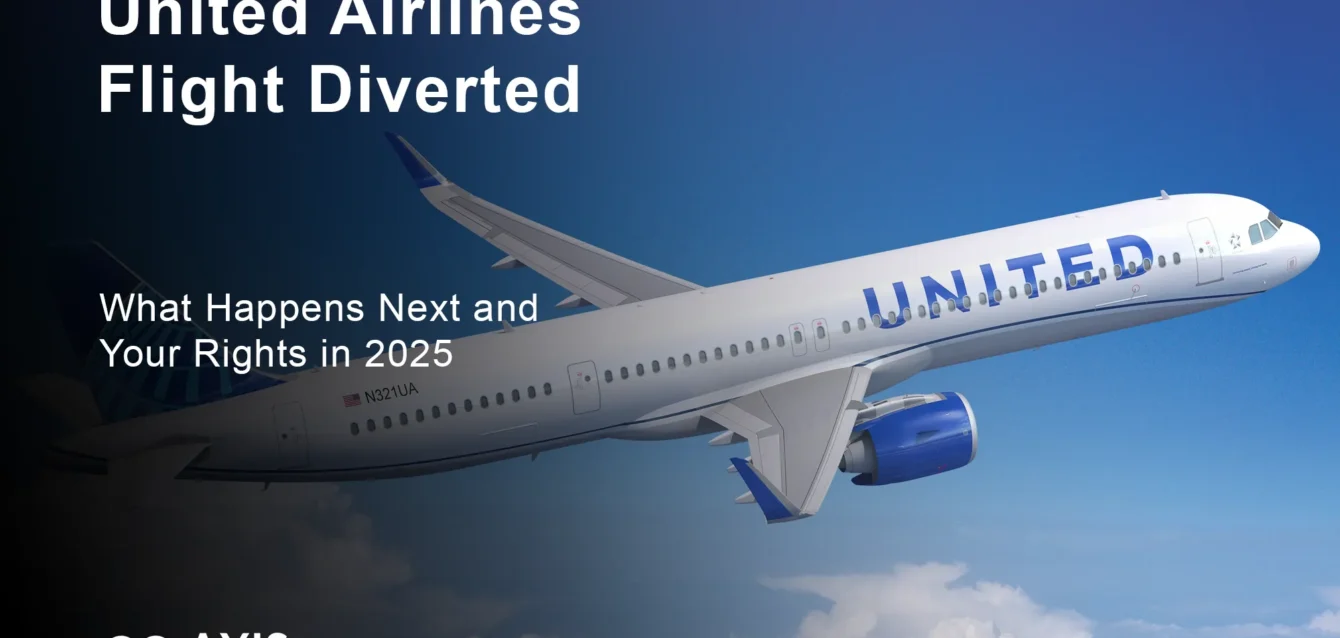United Airlines Flight Diverted 2025
Picture this: you’re settling into your seat on a United Airlines flight, ready for takeoff, when the captain’s voice crackles over the intercom with news no passenger wants to hear. “Ladies and gentlemen, due to circumstances beyond our control, we’ll be diverting to an alternate airport.”
Your heart sinks. What does this mean for your plans? Your connecting flight? Your rights as a passenger?
If you’re reading this because your United flight was just diverted, or you’re preparing for upcoming travel, you’re in the right place. Recent data shows that major US airlines had a diversion rate of 0.33% in 2024, but when it happens to you, that statistic feels like 100%.
This comprehensive guide covers everything you need to know about United Airlines flight diversions, from real incidents that happened in 2024 to your compensation rights under new federal regulations. You’ll discover exactly what to expect, how to protect yourself, and the steps that could save you hundreds of dollars in unexpected expenses.
Inhaltsübersicht
- What Exactly Is a Flight Diversion?
- Recent United Airlines Diversion Incidents: Real Stories from 2024-2025
- The Top 7 Reasons United Flights Get Diverted
- Your Rights When United Diverts Your Flight
- Compensation You May Be Entitled To
- What Happens Immediately After a Diversion
- How to Handle a United Flight Diversion Like a Pro
- United’s Official Policies vs. Reality
- Special Circumstances: International vs. Domestic Diversions
- When Diversions Go Wrong: Horror Stories and Lessons
- Häufig gestellte Fragen
What Exactly Is a Flight Diversion? {#what-exactly-is-a-flight-diversion}
A flight diversion occurs when your aircraft changes course mid-flight and lands at an airport that wasn’t your original destination. Think of it as an unplanned detour in the sky.
Unlike a simple delay where you wait at your departure gate, a diversion means you’re already airborne when the decision gets made. The pilot and air traffic control work together to identify the safest, most practical alternate airport based on fuel levels, runway requirements, and the specific reason for the diversion.
Here’s what makes United Airlines diversions unique: the airline operates one of the largest route networks in the world, which means they often have more flexibility in rebooking passengers compared to smaller carriers. However, this also means United flights traverse some of the most weather-prone and congested airspace in North America.
The key difference between diversions and other disruptions:
- Cancellation: Flight never takes off or returns to origin before departure
- Delay: Extended wait time at your departure airport
- Diversion: Aircraft lands at an unplanned location mid-route
- Emergency landing: Immediate landing due to safety concerns (subset of diversions)
Understanding this distinction matters because your passenger rights and compensation eligibility change dramatically depending on which type of disruption you experience.
Recent United Airlines Diversion Incidents: Real Stories from 2024-2025 {#recent-united-airlines-diversion-incidents}
Learning from real incidents helps you understand what could happen and how United typically responds. Here are some significant United Airlines diversions from the past year:
The Double Trouble Day: December 22, 2024
United Airlines faced double trouble on December 22, 2024, on its two separate flights between Chicago (ORD) and Zurich (ZRH), Switzerland as the Pilot Incapacitated and a flight attendant injured.
Flight UA12 (Zurich to Chicago): After remaining airborne for around 7 hours, the flight crew reported a medical emergency as the pilot fell sick. Another pilot contacted ATC and decided to divert to Halifax. The flight operated by 26.5-year-old Boeing 767-300ER, registered as N665UA landed safely at Halifax at 8:51 PM UTC.
Flight UA3 (Chicago to Zurich): The return flight diverted to Gander International Airport in Canada due to a seriously injured flight attendant.
What passengers experienced: Extended delays, overnight accommodations in Canadian airports, and significant disruption to holiday travel plans. Neither incident was within United’s control, affecting compensation eligibility.
The Cockpit Smoke Scare: December 28, 2024
United Airlines flight from Chicago O’Hare (ORD) to Phoenix Int’l Airport (PHX) diverted to Albuquerque International Airport (ABQ) amid smoke in the cockpit on December 28, 2024.
According to FlightRadar24, United flight UA2225 (UAL2225) took off from Chicago at 3:43 PM UTC. After being airborne for over two hours and 30 minutes, the flight crew reported smoke in the cockpit.
The outcome: The pilots did not declare an emergency, instead, they decided to make a precautionary landing at Albuquerque. The aircraft landed safely at 6:43 AM UTC.
Passenger impact: This type of mechanical issue typically qualifies for compensation under new DOT rules, as it’s considered within the airline’s control.
The Biohazard Flight: July 2024
United Airlines says one passenger’s “medical issue” caused flight 2477 to land in Virginia, where the plane had to be “deep cleaned.” FlightAware shows the flight departing Houston on Sunday morning, then diverting to Washington Dulles International Airport about two hours into the trip.
Audio posted on X by Thenewarea51 captured a flight crew member describing a “biohazard” on board the flight. “It sounds like it’s quite bad back there,” the recording captured. “The crew is vomiting and passengers all around are asking for masks.”
The aftermath: In a statement, United says “we deep cleaned the aircraft and it departed for Boston later that afternoon.”
Lessons from These Incidents
These real-world examples reveal several patterns:
- Medical emergencies (pilot incapacitation, passenger illness) typically don’t qualify for compensation
- Mechanical issues (cockpit smoke, technical problems) often do qualify for compensation
- Response time varies dramatically based on the nature of the emergency
- Communication from United during diversions is often limited initially
- Alternative arrangements depend heavily on the diversion airport’s capabilities
The Top 7 Reasons United Flights Get Diverted {#top-reasons-united-flights-diverted}
Understanding why diversions happen helps you prepare mentally and logistically. Weather Events Behind 45% of All Flight Diversions in Winter 2024, making it the leading cause, but United flights face unique challenges due to their extensive route network.
1. Weather Conditions (45% of diversions)
Most common scenarios:
- Severe thunderstorms at destination airports
- Heavy snow or ice conditions
- Strong crosswinds exceeding aircraft limits
- Dense fog reducing visibility below landing minimums
United’s vulnerability: Chicago O’Hare International Airport experienced a substantial 890 weather-related flight diversions in 2024, and since O’Hare is United’s second-largest hub, weather there creates ripple effects across the entire network.
What this means for compensation: Weather diversions typically don’t qualify for cash compensation, as they’re considered “extraordinary circumstances” outside the airline’s control.
2. Medical Emergencies
Passenger medical emergencies account for roughly 20% of diversions. These range from heart attacks and strokes to unexpected childbirth (yes, it happens).
Crew medical emergencies are rarer but more dramatic, as seen in the December 2024 incident where the pilot fell sick on flight UA12.
Decision factors: Pilots consider proximity to airports with advanced medical facilities, runway length requirements, and customs/immigration capabilities for international flights.
3. Mechanical and Technical Issues
Common technical problems leading to diversions:
- Engine malfunctions or warnings
- Hydraulic system failures
- Avionics (navigation/communication) problems
- Cabin pressurization issues
- Landing gear problems
Recent example: The December 2024 smoke in the cockpit incident shows how even precautionary mechanical concerns trigger diversions.
Compensation implications: Mechanical issues are generally within the airline’s control and may qualify for compensation under new federal rules.
4. Unruly Passengers
Disruptive passenger behavior has become increasingly common. According to the FAA‘s statistics about unruly passengers, such incidents peaked in 2021, when 5,973 passengers were reported to have misbehaved while onboard commercial aircraft. In 2022, 2023, and 2024, there were 2,455, 2,076, and 2,102 such cases, respectively.
Types of disruptive behavior triggering diversions:
- Physical altercations with crew or passengers
- Intoxication and refusal to comply with crew instructions
- Threats to aircraft security
- Interference with flight operations
Real example: A United Airlines flight from San Francisco to Chicago had to divert to Denver due to an unruly passenger that was onboard the Boeing 737-900ER.
5. Air Traffic Control Restrictions
Common ATC-related diversions:
- Airport closures due to security incidents
- Runway closures for emergency aircraft
- Airspace restrictions due to VIP movements
- Air traffic control equipment failures
6. Fuel and Operational Considerations
Scenarios requiring fuel-related diversions:
- Extended holding patterns consuming excess fuel
- Headwinds stronger than forecast
- Multiple approach attempts due to weather
- Air traffic delays creating fuel concerns
7. Security and Geopolitical Issues
Less common but significant causes:
- Suspicious packages or security threats
- Airspace closures due to military activity
- International incidents affecting overflight permissions
- Cyber security concerns affecting airport operations
Your Rights When United Diverts Your Flight {#your-rights-when-united-diverts}
The landscape of passenger rights has changed dramatically in 2024. New Department of Transportation regulations provide stronger protections, but understanding exactly what you’re entitled to can be confusing.
New Federal Regulations (Effective April 2024)
With the new DoT ruling, refunds for diverted flights must be automatic, prompt (within seven business days for credit card payments), in cash or the original form of payment, and the full amount (including all taxes and fees).
Key changes that benefit you:
- Automatic refunds for significantly changed flights
- Prompt processing within 7 business days for credit cards
- Full cash refunds including taxes and fees
- No forced acceptance of travel credits or vouchers
When You’re Entitled to a Full Refund
You can demand a complete refund if:
- Your diverted flight causes a delay of 3+ hours domestically oder 6+ hours internationally
- You don’t accept alternative transportation offered by United
- The diversion changes your departure or arrival airport significantly
Important note: Die Department does not view the refund requirement as applying to these diversion situations. Typically, when a decision to divert a flight is made, the flight has already departed and from the passenger’s perspective, the travel already took place.
This means if you’re already in the air when the diversion occurs, refund rights become more complex than straightforward cancellations.
United’s Contractual Obligations
Beyond federal requirements, United’s Contract of Carriage obligates them to provide:
Immediate assistance:
- Meals and refreshments for delays over 2 hours
- Hotel accommodation for overnight delays
- Transportation between airport and hotel
- Communication assistance (phone calls, emails)
Rebooking services:
- Next available United flight at no extra cost
- Potential rebooking on partner airlines
- Alternative transportation (bus, train) for nearby destinations
International Flight Protections
EU261 Regulation provides additional protections for flights involving European airports:
- Compensation up to €600 for diversions causing 3+ hour delays
- Enhanced meal and accommodation rights
- Stronger rebooking Schutzmaßnahmen
Montreal Convention covers international flights:
- Expense reimbursement for reasonable costs incurred
- Liability for delays beyond airline control
- Documentation requirements for claims
Compensation You May Be Entitled To {#compensation-entitled-to}
The amount of compensation varies dramatically based on your specific circumstances, route, and the cause of the diversion.
Under New US Federal Rules (2024)
The Department of Transportation is implementing a tiered compensation system:
Proposed domestic compensation levels:
- $200-$300 for delays of 3-6 hours
- $375-$525 for delays of 6-9 hours
- $750-$775 for delays of 9+ hours
DOT is considering a tiered approach where compensation could range from $200-$300 for domestic delays of at least three hours but less than six, $375-$525 for delays of at least six hours but less than nine, and $750-$775 for delays of nine hours or more.
Important caveat: These rules apply only when the disruption is within the airline’s control. Weather, air traffic control, and security issues typically don’t qualify.
European Union Compensation (EU261)
For flights covered by EU261 regulation:
Distance-based compensation:
- €250 for flights under 1,500km with 3+ hour delays
- €400 for EU flights over 1,500km or non-EU flights 1,500-3,500km with 3+ hour delays
- €600 for flights over 3,500km with 3+ hour delays
Covered flights:
- Departing from any EU airport on any airline
- Arriving in EU on EU-based airlines
- United flights qualify when departing from EU airports
What United Currently Offers
Voluntary compensation programs:
- Meal vouchers during extended delays
- Hotel accommodations for overnight disruptions
- Transportation to/from hotels
- Rebooking at no charge on next available flight
Recent improvements: Following DOT pressure, United has committed to providing at least $50 in credits or vouchers for controllable disruptions, though this falls short of proposed federal requirements.
Extraordinary Circumstances (No Compensation)
You typically won’t receive cash compensation for diversions caused by:
- Severe weather conditions
- Air traffic control decisions
- Medical emergencies
- Security threats
- Acts of God (volcanic ash, earthquakes)
However, you’re still entitled to care and assistance (meals, accommodation, rebooking) regardless of the cause.
What Happens Immediately After a Diversion {#what-happens-after-diversion}
Understanding the typical sequence of events helps you stay calm and make better decisions during a stressful situation.
Step 1: The Announcement
What you’ll hear: The captain typically announces the diversion 20-30 minutes before landing at the alternate airport. The initial announcement often lacks details about the specific reason or next steps.
What’s happening behind the scenes: Flight crew is coordinating with air traffic control, the airline’s operations center, and the destination airport to arrange ground services.
Step 2: Landing and Initial Ground Operations
Upon landing: The aircraft may taxi to a gate or remain on the tarmac, depending on the airport’s capacity and the nature of the diversion.
Passenger considerations: You’ll likely remain seated while crew coordinates next steps. This can take 30 minutes to several hours.
Step 3: Information Updates
Communication challenges: Initial information is often limited. Flight attendants may not have details about rebooking or accommodation plans immediately.
Your role: Stay patient but assertive. Ask specific questions about timing and your options.
Step 4: Deplaning and Ground Services
Deplaning process: Priority is given to passengers with urgent medical needs, tight connections, or special assistance requirements.
Ground services: Depending on the airport, United may have limited staff or need to coordinate with partner airlines or ground handling companies.
Step 5: Rebooking and Accommodation
Immediate rebooking: United will attempt to get you on the next available flight. This might be on United, a partner airline, or even a competitor.
Accommodation decisions: Hotels are provided for overnight delays, but availability can be limited, especially during peak travel periods or at smaller airports.
Alternative transportation: For nearby destinations (under 200 miles), United might arrange bus transportation instead of rebooking flights.
How to Handle a United Flight Diversion Like a Pro {#how-to-handle-diversion}
Experienced travelers know that preparation and smart decision-making during diversions can save hours of hassle and hundreds of dollars.
Before You Travel: Prevention and Preparation
Flight selection strategies:
- Choose earlier flights when possible to allow rebooking options
- Avoid the last flight of the day to your destination
- Consider layovers for important trips instead of direct flights through weather-prone areas
- Monitor weather patterns at your destination 24-48 hours before travel
Travel insurance considerations:
- Trip interruption coverage can reimburse additional expenses
- Missed connection protection helps with onward travel costs
- Medical coverage for diversions to international locations
- Cancel for Any Reason policies provide maximum flexibility
During the Diversion: Immediate Actions
Stay informed:
- Listen carefully to all announcements
- Use United’s app for real-time updates
- Follow @United on social media for system-wide information
- Ask flight attendants specific questions about timing and options
Protect your rights:
- Keep all receipts for meals, transportation, accommodation
- Document everything with photos and notes
- Don’t sign waivers that might limit your compensation rights
- Refuse vouchers if you prefer cash compensation
Make smart decisions:
- Consider alternative airports if offered multiple rebooking options
- Evaluate rental cars for nearby destinations
- Book backup options if you have important commitments
- Stay flexible on routing if it gets you there faster
Technology Tools That Help
United’s mobile app:
- Real-time rebooking options
- Digital boarding passes
- Customer service chat
- Expense tracking for reimbursement
Third-party apps:
- FlightAware for detailed flight tracking
- Hotel Tonight for last-minute accommodations
- Rome2Rio for alternative transportation options
- Weather apps to understand delay causes
Communication Strategies
With United staff:
- Be polite but persistent about your needs
- Ask for supervisors if frontline staff can’t help
- Request documentation of delays and reasons
- Get names and reference numbers for all interactions
With family/business contacts:
- Communicate early about potential delays
- Provide regular updates as situation develops
- Share tracking information so others can monitor progress
- Arrange alternative plans for time-sensitive commitments
United’s Official Policies vs. Reality {#united-policies-vs-reality}
Understanding the gap between what United promises and what actually happens helps set realistic expectations and prepare for common issues.
What United’s Contract of Carriage Says
Official commitments:
- Rebooking on next available flight at no charge
- Meals for delays over 3 hours
- Hotel accommodation for overnight delays
- Transportation to/from hotels
- Communication assistance
Compensation limitations:
- No cash compensation for weather delays
- Limited liability for consequential damages
- Right to substitute alternate transportation
- 24-hour cancellation window for full refunds
Real-World Implementation Challenges
Staffing limitations at smaller airports: Many diversion airports have limited United staff, leading to:
- Extended wait times for rebooking
- Limited knowledge of policies among contract staff
- Difficulty reaching United customer service
- Confusion about accommodation approvals
Hotel availability issues: During weather events affecting multiple flights:
- Hotels near airports quickly fill up
- United may offer accommodations far from airports
- Passengers sometimes responsible for transportation costs
- Quality of provided accommodations varies significantly
Meal voucher realities:
- Voucher amounts often insufficient for airport food prices
- Limited restaurant options at smaller airports
- Vouchers may not work at all available vendors
- No additional compensation for dietary restrictions
Hidden Policies That Work in Your Favor
Goodwill compensation: United customer service representatives have discretion to offer:
- Additional miles or upgrade certificates
- Vouchers beyond standard amounts
- Waived fees for changes or upgrades
- Status extensions for elite members
Partner airline rebooking: When United can’t accommodate you:
- Star Alliance partners often have space
- United may book you on competitors in extreme circumstances
- International partners may offer superior service
- You keep your original United ticket benefits
Alternative transportation authorization: For ground transportation under 200 miles:
- United may approve rental cars
- Bus transportation to nearby cities
- Train tickets for rail-served destinations
- Reimbursement up to cost of new flight ticket
Special Circumstances: International vs. Domestic Diversions {#international-vs-domestic}
International diversions create additional complexities that don’t exist with domestic flights, particularly around customs, immigration, and passenger rights.
International Diversion Complications
Customs and immigration issues:
- Transit vs. entry requirements vary by country
- Visa requirements for unplanned destinations
- Passport validity rules for extended stays
- Duty-free purchase complications with diversions
Real-world scenario: If your United flight from Frankfurt to Chicago diverts to Montreal, you may need:
- Canadian entry authorization (eTA for US citizens)
- Proof of onward travel
- Potential quarantine requirements
- Currency for local expenses
Medical and prescription considerations:
- Prescription access in foreign countries
- Travel insurance coverage variations by location
- Emergency medical care availability and costs
- Prescription drug legality in diversion countries
Enhanced Rights for EU-Connected Flights
EU261 regulation provides superior protection:
- Cash compensation up to €600 for qualifying delays
- Enhanced meal allowances (typically €15-25 per meal)
- Better hotel standards compared to US requirements
- Faster rebooking Anforderungen
Coverage scenarios:
- US to EU flights: EU261 applies only on European airlines
- EU to US flights: EU261 applies regardless of airline
- EU internal flights: Full EU261 protection
- Third country connections: Complex rules requiring legal analysis
Duty and Tax Implications
Customs complications:
- Duty-free allowances may reset with unplanned entries
- Import restrictions on medications or foods
- Declaration requirements for valuable items
- Re-entry procedures for returning to transit status
VAT and tax recovery:
- EU VAT refunds may be complicated by diversions
- Travel expense deductibility for business travelers
- Currency exchange losses from extended delays
- Receipt requirements in foreign languages
When Diversions Go Wrong: Horror Stories and Lessons {#when-diversions-go-wrong}
Learning from passenger experiences helps you avoid common pitfalls and understand what can go wrong even with well-intentioned airline efforts.
The “Forgotten Passengers” Incident
What happened: A United flight diverted to a small regional airport during a snowstorm. Ground staff went home for the night, leaving 150 passengers stranded in an airport with no food service, limited heating, and locked restrooms.
Dauer: 14 hours before alternative arrangements were made.
Lessons learned:
- Bring snacks and water for any flight over 2 hours
- Pack extra medications in carry-on luggage
- Charge devices fully before departure
- Keep cash for emergencies at unstaffed locations
The “Hotel Shuttle from Hell”
What happened: United arranged hotel accommodations 45 minutes from a diversion airport. The shuttle service was overwhelmed, with passengers waiting 3+ hours for transportation, missing connections the next day.
Financial impact: Passengers incurred $300+ in additional accommodation and rebooking costs.
Lessons learned:
- Research alternate hotels near diversion airports
- Consider rental cars for flexibility
- Join hotel loyalty programs for better availability
- Keep backup payment methods for emergencies
The “Documentation Disaster”
What happened: Passengers received verbal promises of compensation for controllable delays but had no written documentation. United later denied the commitments, claiming weather as the cause.
Resolution timeline: 6 months of back-and-forth before partial resolution.
Lessons learned:
- Get everything in writing or via email
- Photograph delay boards showing reasons
- Record conversations if legally permitted
- Save all receipts regardless of verbal assurances
The “International Immigration Nightmare”
What happened: A US-bound United flight diverted to Canada. Passengers without proper Canadian entry documents were held at the airport for 18 hours while immigration processed each case individually.
Additional complications: Missed medications, missed onward flights, confused family members.
Lessons learned:
- Research visa requirements for potential diversion countries
- Carry extra medications in original containers
- Notify emergency contacts of travel routes
- Understand travel insurance coverage for immigration delays
Häufig gestellte Fragen {#faq}
How long can United keep me on a diverted plane?
Federal regulations limit tarmac delays to 3 hours for domestic flights und 4 hours for international flights before passengers must be offered the opportunity to deplane. However, safety and security concerns can extend these limits.
Practical reality: Most diversions involve deplaning within 1-2 hours, but airport congestion or weather can extend this significantly.
Will United pay for my hotel if the diversion causes an overnight delay?
Generally yes, but with important caveats:
- United provides accommodation for overnight delays regardless of cause
- Hotel quality and location vary significantly
- You may be responsible for transportation if hotel shuttles aren’t available
- During major weather events, availability becomes extremely limited
Can I get compensation if the diversion was caused by weather?
Under US federal law: Weather diversions typically don’t qualify for cash compensation as they’re “extraordinary circumstances.”
Under EU261: Weather still doesn’t qualify for compensation, but you receive enhanced meal and accommodation rights.
United’s policies: The airline still provides care (meals, hotels, rebooking) but not cash compensation for weather diversions.
What if I miss my cruise/wedding/important event due to a diversion?
United’s liability is limited to the value of your ticket for consequential damages. However:
- Travel insurance with trip interruption coverage can help
- Documented controllable causes (mechanical issues) may justify additional compensation
- Executive-level complaints sometimes result in goodwill gestures
- Legal action is possible but rarely cost-effective for individual cases
Can United force me to accept a voucher instead of cash compensation?
Under new 2024 federal rules: No. United must provide cash refunds for significantly changed flights if you refuse alternative arrangements.
Existing flights: Rules apply to tickets purchased after April 2024 or flights after the effective date.
Voluntary acceptance: You can still choose vouchers if they offer better value, but United cannot force this choice.
What happens to my checked baggage during a diversion?
Typical process: Baggage usually stays with the aircraft and transfers to your rebooked flight automatically.
Potential issues:
- International diversions may require customs inspection
- Extended delays might allow baggage claim at diversion airport
- Aircraft changes can cause baggage to miss connections
- Documentation helps track baggage through irregular operations
How do I document everything for a compensation claim?
Essential documentation:
- Original boarding passes and ticket receipts
- Photos of delay/cancellation boards with reasons displayed
- All receipts for meals, transportation, accommodation
- Written communications from United staff
- Timestamps and details of all interactions
Digital tools: Use United’s app to screenshot rebooking options and delay notifications for official documentation.
Can I book my own hotel and get reimbursed?
Generally no unless United specifically authorizes it. However:
- Emergency situations (airport closure, no available shuttle) may justify self-booking
- Pre-authorization from United customer service protects you
- Reasonable costs (similar to United’s contracted rates) more likely to be reimbursed
- Keep all documentation including why United’s arrangements weren’t suitable
Final Thoughts: Turning Disruption into Opportunity
Flight diversions are never convenient, but understanding your rights and preparing for the unexpected can minimize stress and maximize compensation. The airline industry is evolving rapidly, with new federal regulations strengthening passenger protections and airlines adapting their policies accordingly.
Key takeaways for United Airlines passengers:
Before you fly: Choose flights strategically, purchase appropriate travel insurance, and understand your rights under both federal and international regulations.
During a diversion: Stay calm, document everything, make smart immediate decisions, and don’t accept inadequate care just to avoid confrontation.
After the experience: File claims promptly, follow up persistently, and use the experience to improve future travel planning.
The landscape of passenger rights continues to evolve. The Department of Transportation’s proposed compensation requirements could fundamentally change how airlines handle controllable disruptions, making cash compensation automatic rather than discretionary.
Unterm Strich: While you can’t prevent flight diversions, you can control how well you handle them. Armed with knowledge of your rights, practical strategies for managing disruptions, and realistic expectations about airline policies, you’ll be prepared to turn an inconvenient diversion into a manageable travel hiccup.
Safe travels, and remember – every experienced traveler has at least one diversion story. Make sure yours ends with you getting what you’re entitled to.





